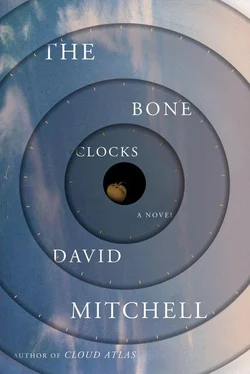What grade, I wonder, would me and Holly get, on the relationship scorecard of the Reverend Audrey Withers? C+? D—?
“When’s the bit where Uncle Peter kisses her?” asks a kid.
The congregation laughs. “Great idea.” The Reverend Audrey Withers looks like a woman who enjoys her job. “Why not just skip to the good bit?”
NASSER DROVE THE half-Corolla half — Fiat 5. Aziz occupied the passenger seat with his camera under a blanket at his feet, and I sat in the back behind a screen of dry cleaning, ready to burrow into the footwell under sheets and boxes of infant formula. Baghdad’s low-rise western suburbs stretched out along the four-lane highway to Fallujah. After a mile or two the apartment blocks gave way to middle-class streets from the money-slick 1970s: whitewashed, flat-roofed houses surrounded by high walls and steel gates. Then we passed a few miles of two-story cinder-block buildings, with shops or workshops below and meager living quarters above. These acquired the visual repetition of a cheap cartoon. We passed several petrol stations, whose queues went on for many hundreds of vehicles. The drivers would be waiting there all day. Even in April, the sun was more of a glaring sky zone than the bright disk of northern latitudes. Unemployed men of all ages stood around in dishdashas, smoking and talking. Women in hijabs or full-length burkas walked in small groups, carrying plastic bags of vegetables: It struck me that Iraq was looking more Iranian by the week. Kids Aoife’s age played at Insurgents Versus Americans. Nasser fed a cassette into the player, and Arabic music blammed out through the tinny speakers. A woman sang scales I’m not hardwired for, and the song must have been a classic because both Nasser and Aziz got to work on the backing vocals. During an instrumental break, I asked Nasser — half shouting above the din of the car and the music — what the song was about. “A girl,” my fixer half-shouted back. “Man she love go to Iran to fight the war, but he never come back. She very beautiful, so other men say, ‘Hey, honey, I got money, I got big house, I got wasta , you marry me?’ But the girl she say, ‘No, I wait one thousand years for my soldier.’ Sure, this song is very … How you say? — like sugar too much? I forget word — santi-mantle?”
“Sentimental.”
“ Veeery sentimental, and my wife say, the girl of this song, she is crazy! If she don’t marry, what happen to her? Dead soldiers can’t send money! She gonna starve! Only a man write so stupid song, my wife say. But I say, ‘Ah …’ ” Nasser made a dismissive motion with his hand. “This song touch me.” He thumped his chest. “Love is more strong than the death.” He turned around. “You know?”
IVANO DEL PIO at the Sydney Morning Herald had recommended Nasser as a fixer when he left Baghdad, and he was one of the best I’ve ever employed. Preinvasion, Nasser had worked in broadcasting and had reached management level, which meant he’d had to join the Ba’ath Party. He had a decent house and could support his wife and three children, even in a society starved by U.S. and UN sanctions. Postinvasion, Nasser scraped a living from working for foreign press. Under Saddam’s regime the official fixers were a shifty crew, paid to feed you Saddam’s line and inform the Mukhabarat about any ordinary Iraqis foolish enough to try to tell you anything true about life under the dictator. Nasser, however, had a journalist’s nose and eye, and on some of my best stories for Spyglass I insisted he received credit and pay as co-writer. He never used his real name, however, in case an enemy denounced him to any of a dozen insurgency groups as a collaborator. Aziz the photographer was an ex-colleague of Nasser’s, but his English was as limited as my Arabic so I didn’t know him as closely as I did my fixer. He knew his trade, though, and was cautious, crafty, and brave in pursuit of a good shot. Photography is a dangerous hobby in Iraq; the police assume that you’re recceing for a suicide mission.
We passed crumbling walls and decrepit shops.
“You break it,” Colin Powell had warned Bush, in what’s become known as the Pottery Barn Anecdote, “you’ll own it …”
Bedraggled families sifted giant tumuli of rubbish.
“You’ll be the proud owner of twenty-five million people …”
Lines of streetlamps, most leaning over, some fallen.
“All their hopes, aspirations, problems. You’ll own it all.”
We passed a buckled crash barrier by a small crater: the site of an IED attack. We hit an official checkpoint manned by the Iraqi police that cost us forty minutes. Official police shouldn’t hassle a foreign journalist but we were all relieved that they didn’t seem to notice my foreignness. Nasser’s car is in a bad way even by Iraqi standards, but its shiteness acts as professional camouflage. What self-respecting journo, agent, or jihadist would travel in such a pile of crap?
The further west we drove, the riskier our venture became. Nasser’s local knowledge grew scantier, and both the Abu Ghraib Highway and the N10 would be littered with dozens of roadside IEDs. The obvious targets for these were the U.S. military convoys, but knowing that any dead dog or cardboard box or bin-bag of crap might conceal enough explosives to roast a Humvee put you on permanent edge. Then there was the danger of kidnapping. My darkish complexion, beard, brown eyes, and local attire let me pass as a pale Iraqi at first glance, but my basic Arabic betrays me as a foreigner within a few words. I had my fake Bosnian passport to explain my poor language skills while claiming a Muslim affinity, but subterfuge is a high-risk game, and if a mob could be calmly reasoned with, it wouldn’t be a mob. Bosnians aren’t obvious kidnappees for ransom bounty, but neither were Japanese NGO workers until a fortnight ago. If my press pass was found, my value would go up; I’d be sold as a spy to an Al Qaeda affiliate, and they’re less interested in money than in a recorded “confession” and a beheading for the webcam. Midway between Baghdad and Fallujah we reached the town of Abu Ghraib, famous for decaying factories, palm dates, and a vast prison complex where Saddam’s enemies, or potential enemies, used to be tortured in submedieval conditions. Big Mac hears rumors that not a lot has changed under the CPA. We passed its high, kilometer-long fortified wall on the left and Nasser translated a slogan daubed on a bombed-out building facing it: We will knock on the gates of Heaven with American skulls . That was a killer opening or closing line for an article. I jotted it down in my notebook.
In front of a mosque, Nasser pulled over to give plenty of space to a U.S. convoy joining the highway. Aziz took a few pictures from inside the car, but didn’t dare get out; to a jumpy gunner, a telephoto lens looks like an RPG launcher. I counted twenty-five vehicles in the Fallujah-bound convoy, and wondered if Big Mac was sweating his butt off in any of the Humvees. Then Aziz said something in Arabic and Nasser told me, “Ed, trouble!” Half a dozen men were walking towards us from a row of low buildings alongside the mosque.
“Let’s go,” I said.
Nasser turned the ignition.
Nothing.
Nasser turned the ignition.
Nothing.
Three seconds to decide whether to bluff it, or hide …
I slid down under the milk cartons, a few seconds before a man exchanged greetings with Nasser through the driver’s window. The man asked us where we were going. Nasser said he and his cousin were taking supplies to Fallujah. Then the man asked Nasser, “Are you a Sunni or a Shi’a?”
A dangerous question; preinvasion, I seldom heard it.
Nasser replied, “While Fallujah burns, we are all Iraqis.”
Читать дальше












